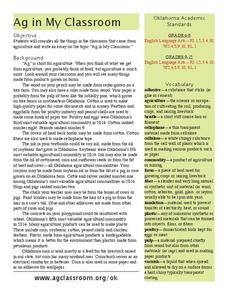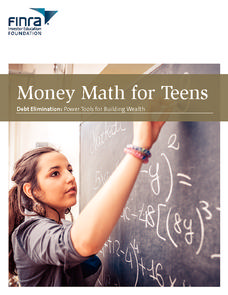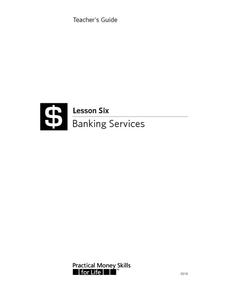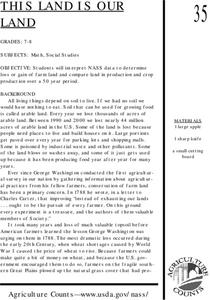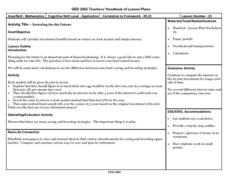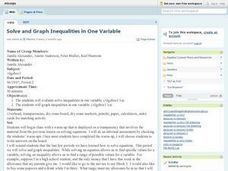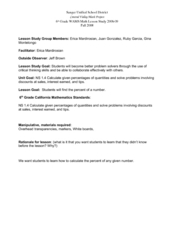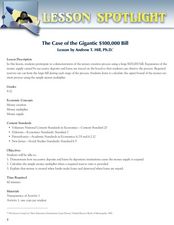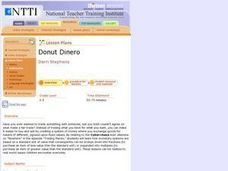Curated OER
Next Year's Seeds
Reading, a math game, and a simulation activity provide the engagement on a lesson about seeds and crops. Learners in grades two through four read an informational passage about crops, seeds, and farming. They highlight important...
Curated OER
Taxes
Fourth graders read Stone Fax and explore earning money, saving, credit and taxes. In this taxes activity, 4th graders complete a worksheet to develop understanding of paying off debts, keeping a checkbook, calculating sales tax and...
Curated OER
Potato: A Tale from the Great Depression
Learners barter for goods within the class. For this economics lesson based on the Great Depression, the teacher introduces the lesson with a picture book, then students are allowed to barter with teacher supplied goods as they examine...
Curated OER
Ag in My Classroom
Students explore the definition of agriculture. In this Language Arts and Social Studies lesson, students read an article on products that are produced in agriculture, then they complete a vocabulary assignment and write an essay on the...
Money Math for Teens
Debt Elimination - Power Tools for Building Wealth
What does it mean to be wealthy? Your learners will consider how carrying debt affects budgeting, and learn about the debt snowball strategy and how is it used in the concept of eliminating debt in order to build wealth.
Council for Economic Education
Calculating Simple Interest
How much is owed? A calculated resource introduces the simple interest formula with a video that describes how to use it. Classmates then show what they know by answering questions within a simple interest worksheet.
Visa
Banking Services
From writing and depositing checks to comparing ATM and debit cards, pupils develop financially savvy practices and build foundational knowledge of the financial service products available through banking institutions.
Curated OER
Using Bar Graphs to Understand Voting Patterns
Bar graphs are used as a way to study voting patterns in the United States. A variety of statistical data is presented in the graphs, and pupils must interpret the data in order to make a report to the class. Three excellent graphs,...
Curated OER
This Land is Our Land
Young scholars interpret NASS data to determine loss or gain of farm land and compare land in production and crop production over a 50 year period.
Curated OER
Survey Says...
Young statisticians collect, organize, and present data to illustrate responses to a survey question. They write and conduct the survey. They finish by presenting the results in the form of a graph.
Curated OER
History of Toys and Games
Students research history of popular toys to learn when those toys were first introduced. They use measurement skills to create an accurate timeline.
Curated OER
Investing for the Future
Twelfth graders perform basic calculations for saving and investment strategies. they simulate the investment of $1,000 in the stock market and savings account. they determine which pays the greater dividend.
Curated OER
Graphing Inequalities in Equations
Can a person solve and graph inequalities in one variable? Sounds impossible but it's not! Young mathematicians solve and graph inequalities in algebraic equations. They find a range of possible values for a variable as they solve...
Curated OER
Calculate Percentages
Sixth and seventh graders study the concept of finding the percent of a number. They calculate the percent of any given number. Pupils describe ways to use calculating percents in their daily life, and change percents into decimals,...
Curated OER
Making Felt Bags
Pupils study the history of bags, pouches and purses. Use of these items spans the entire globe and encompasses practically every civilization. The instructional activity culminates with learners creating their own bag from a variety of...
Curated OER
Ohio Virtual Academy: Learning Online
Young scholars spend time researching online education facilities. After interviewing teachers, they develop a survey on how productive online education sites are to its students. They write a story for the school newspaper about this...
Curated OER
A Fraction of the Cost
Students use various coin denominations to explore the concept of fractions. They demonstrate an understanding of the fractions 1/2 ($.50), 1/4 ($.25), 10ths ($.10) and 20ths ($.05) by using fraction circle pieces to create whole units...
Curated OER
Business: Making a Budget
Students plan a one-month budget, allowing for unexpected expenses. Using checkbook skills, they pay mock bills. Working in small groups, students watch a teacher-prepared Powerpoint presentation, visit financial Websites, and utilize...
Curated OER
In the Bag!
Pupils calculate how many quarters are in a $1,000 bag (after learning the dollar value of filled coin bags). They explain their problem-solving strategy using pictures, numbers, equations, and/or words.
Curated OER
How Many Pennies?
Learners estimate the number of pennies it takes to fill outlines of various basic shapes.
Education World
Pot of Gold Addition
In this adding monetary amounts worksheet, students solve 16 problems that require them to find the sums of the addition problems.
Curated OER
Decision-Making Tool
Students work together to decide where their donated money should go. They list the possible choices and evaluate what is most important to them. They must have a consensus before the money is donated.
Curated OER
The Case of the Gigantic $100,000 Bill
Students investigate the money creation process and calculate the upper bound of the money creation process using a money multiplier. In this money creation lesson, students use a imitation $100,000 bill. Students demonstrate successive...
Curated OER
Donut Dinero
Students set up a classroom currency exchange and explore the idea of bartering to get what they want. They create a monetary unit that is based on fractions and multiples of a standard unit, and compare this system to the U.S. monetary...





